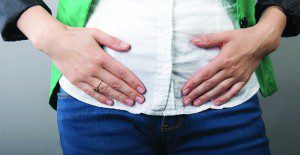By Dr Manuel Bustamante
 Have you ever eaten something and within a few hours realized that your stomach is so bloated that you can’t button your pants? It’s not uncommon for patients to say that they wake up with a flat belly and by the end of the day they look six months pregnant.
Have you ever eaten something and within a few hours realized that your stomach is so bloated that you can’t button your pants? It’s not uncommon for patients to say that they wake up with a flat belly and by the end of the day they look six months pregnant.
Even if you haven’t experienced abdominal swelling to such an extreme, any amount of bloating is not normal; it’s a sign of intestinal inflammation. If you’re having gas and/or bloating regularly, you could have food sensitivities and/or a gut infection, such as SIBO.
What is SIBO?
Small intestinal bacterial overgrowth occurs when the bacteria in our gut get out of balance and overgrow. As the old saying goes,, “Too much of a good thing can be a bad thing.” How do we get too much of some bacteria over others? This can manifest in several different ways, and often occurs in those eating a diet high in sugar, alcohol and refined carbohydrates. Certain strains of bacteria feed off of refined carbohydrates and break them down into short-chain fatty acids, creating gas and causing bloating.
Another strain of bacteria can break down bile salts before your body has a chance to use them. Bile salts are crucial for the breakdown of fats; without them, the end result is fat malabsorption or diarrhea.
Finally, a third type of bacteria can produce toxins that damage the lining of the small intestine. This prevents your body from absorbing the nutrients you need, much like what we see with a leaky gut.
What causes the bacterial overgrowth?
Our gut relies on nerves, muscles, enzymes, and neurotransmitters to properly digest food. While enzymes mainly break down our food, the nerves, muscles and neurotransmitters physically move the food through our digestive tract from the stomach to the small intestine and to the colon.
When this happens in a healthy gut, bacteria gets passed through the digestive tract along with the food to its final destination in the colon. Problems arise when something interferes with this process.
Damage to the nerves or muscles in the gut can result in leftover bacteria in the small intestine, increasing your risk for SIBO. For example, diabetes mellitus and scleroderma can both affect the muscles in the gut, leaving room for SIBO to develop.
Physical obstructions in the gut, like scarring from surgeries or Crohn’s disease, can also cause an abnormal buildup of bacteria in the small intestine. Diverticuli, which are tiny pouches that can form in the wall of the small intestine, can also collect bacteria instead of passing it on to the colon, where it belongs.
There are also medications that influence or disrupt the normal gut flora, such as antibiotics, acid-blocking drugs, and steroids. And of course, as I mentioned above, the most common cause I see in my functional medicine clinic is from a diet high in sugar, refined carbohydrates and alcohol.
10 Signs Of Small Intestinal Bacterial Overgrowth (SIBO)
1. Gas
2. Bloating
3. Diarrhea
4. Abdominal pain or cramping
5. Constipation (much less common than diarrhea)
6. Diagnosis of irritable bowel syndrome or inflammatory bowel disease
7. Food intolerances such as gluten, casein, lactose, fructose and more
8. Chronic illnesses such as fibromyalgia, chronic fatigue syndrome, diabetes, neuromuscular disorders and autoimmune diseases.
9. B12 deficiency as well as other vitamins and minerals
10. Fat malabsorption
How to test for SIBO
Breath Test: This is the gold standard, individuals must fast for 12 hours, breathe into a small balloon, ingest a precise amount of sugar, and repeat breath samples every 20 minutes for 3 hours.
Comprehensive Stool Test: This is also a functional medicine lab test looking at the flora of the large intestines. If I see all elevated levels of good bacteria, I suspect SIBO.
History: By listening to the patient’s history and symptoms, I’m often able to make a diagnosis.
How to treat SIBO
The standard treatment for SIBO is an antibiotic called Xifaxan. Because Xifaxan is not well absorbed throughout the body, it mostly stays in the gut and is very effective against SIBO. A diet low in carbohydrates and free of refined flours, sugars and alcohol can minimize and eliminate the symptoms also.
Similar to Candida overgrowth, those who are susceptible to SIBO may have reoccurrence after treatment. It is advised to adopt a long-term diet that is low in carbohydrates and especially refined carbohydrates.
Bloating and inflammation is not a normal response to eating. If you experience any of the above symptoms you may have SIBO. For more information on SIBO or to schedule a consultation call 239-593-6201 today!
239.593.6201 | gastronaples.com









